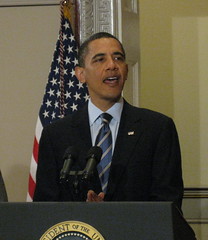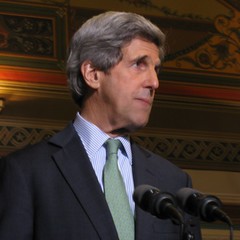Friday
May082009
Obama Wants You to Go Back to School
By Michael Ruhl, University of New Mexico – Talk Radio News Service
Today President Barack Obama announced a new effort to stimulate tomorrow’s economy by reviving higher education through expanding Pell Grants and removing barriers to success. The public face for his new initiative is to be Dr. Jill Biden, wife of Vice-President Joe Biden and Community College Professor.
Obama’s plan, detailed at opportunity.gov, would help the unemployed go back to school to build new skill sets, with the goal of helping them gain future employment through specialized technical training.
“The idea here is to fundamentally change our approach to unemployment in this country, so that it’s no longer just a time to look for a new job, but is also a time to prepare yourself for a better job,” Obama said. “Our unemployment system should be not just a safety net, but a stepping stone to a new future.”
Among the barriers to success that the President wants to break down are state programs in which a worker might lose temporary financial support if they were to enroll in an education program. Obama said that in some places a worker may be unemployed, but may not qualify for federal assistance to get an education because of the salary they had a year ago but no longer make. The President said that he is committed to working with states to change these laws.
The President said that knowledge is the most valuable skill that one can sell. He encouraged all Americans to aim for getting at least 1 year of higher education, whether it is a community college, a four year school, vocational training or an apprenticeship.
“By 2020, America will once again have the highest proportion of college graduates in the world,” Obama said optimistically.
This announcement came on the same day as the release of April’s unemployment statistics, which saw the loss of more than half a million jobs. The unemployment rate for April was 8.9 percent, up from 8.5 percent in March and 8.1 percent in February. April's numbers have already surpassed both the White House's and the Federal Reserve's projections for all of 2009, which were 8.1 percent and 8.8 percent, respectively.
Acknowledging that unemployment is as its highest rate in 25 years, the President urged patience, reminding us that the economic problems didn’t happen overnight, and couldn’t be fixed immediately.
“We’re still in the midst of a recession that was years in the making and will be months or even years in the unmaking,” Obama said. He continued, “We should expect further job losses in the months to come.”
Obama said that the Economic Stimulus Package is yielding real results, manifest in higher consumer spending and home sales, and an increase in construction spending. He praised the Recovery Act, and said, “Because of this plan, cops are still on the beat and teachers are still in the classroom; shovels are breaking ground and cranes dot the sky; and new life has been breathed into private companies.”
Fixing the economy and reforming education are two goals Obama has set for his administration. He said that in the weeks to come he would start working towards more education initiatives.
Today President Barack Obama announced a new effort to stimulate tomorrow’s economy by reviving higher education through expanding Pell Grants and removing barriers to success. The public face for his new initiative is to be Dr. Jill Biden, wife of Vice-President Joe Biden and Community College Professor.
Obama’s plan, detailed at opportunity.gov, would help the unemployed go back to school to build new skill sets, with the goal of helping them gain future employment through specialized technical training.
“The idea here is to fundamentally change our approach to unemployment in this country, so that it’s no longer just a time to look for a new job, but is also a time to prepare yourself for a better job,” Obama said. “Our unemployment system should be not just a safety net, but a stepping stone to a new future.”
Among the barriers to success that the President wants to break down are state programs in which a worker might lose temporary financial support if they were to enroll in an education program. Obama said that in some places a worker may be unemployed, but may not qualify for federal assistance to get an education because of the salary they had a year ago but no longer make. The President said that he is committed to working with states to change these laws.
The President said that knowledge is the most valuable skill that one can sell. He encouraged all Americans to aim for getting at least 1 year of higher education, whether it is a community college, a four year school, vocational training or an apprenticeship.
“By 2020, America will once again have the highest proportion of college graduates in the world,” Obama said optimistically.
This announcement came on the same day as the release of April’s unemployment statistics, which saw the loss of more than half a million jobs. The unemployment rate for April was 8.9 percent, up from 8.5 percent in March and 8.1 percent in February. April's numbers have already surpassed both the White House's and the Federal Reserve's projections for all of 2009, which were 8.1 percent and 8.8 percent, respectively.
Acknowledging that unemployment is as its highest rate in 25 years, the President urged patience, reminding us that the economic problems didn’t happen overnight, and couldn’t be fixed immediately.
“We’re still in the midst of a recession that was years in the making and will be months or even years in the unmaking,” Obama said. He continued, “We should expect further job losses in the months to come.”
Obama said that the Economic Stimulus Package is yielding real results, manifest in higher consumer spending and home sales, and an increase in construction spending. He praised the Recovery Act, and said, “Because of this plan, cops are still on the beat and teachers are still in the classroom; shovels are breaking ground and cranes dot the sky; and new life has been breathed into private companies.”
Fixing the economy and reforming education are two goals Obama has set for his administration. He said that in the weeks to come he would start working towards more education initiatives.
tagged  2009,
2009,  2020,
2020,  America,
America,  American Recovery and Reinvestment Act,
American Recovery and Reinvestment Act,  April,
April,  Barack Obama,
Barack Obama,  Community College,
Community College,  High School,
High School,  High School Diploma,
High School Diploma,  Jill Biden,
Jill Biden,  Joe Biden,
Joe Biden,  Michael Ruhl,
Michael Ruhl,  Numbers,
Numbers,  President Obama,
President Obama,  Ruhl,
Ruhl,  Statistics,
Statistics,  Vice-President Biden,
Vice-President Biden,  White House,
White House,  apprenticeship,
apprenticeship,  biden,
biden,  college,
college,  construction,
construction,  department of labor,
department of labor,  diploma,
diploma,  economic stimulus,
economic stimulus,  economy,
economy,  entitlement,
entitlement,  entitlement program,
entitlement program,  government,
government,  graduate,
graduate,  higher education,
higher education,  housing crisis,
housing crisis,  housing market,
housing market,  job,
job,  jobless,
jobless,  knowledge,
knowledge,  michael,
michael,  michael t ruhl,
michael t ruhl,  michaeltruhl,
michaeltruhl,  obama,
obama,  opportunity,
opportunity,  opportunity.gov,
opportunity.gov,  police,
police,  president,
president,  professor,
professor,  recession,
recession,  ruhl writing sample,
ruhl writing sample,  skill,
skill,  social security,
social security,  stimulus package,
stimulus package,  unemployment,
unemployment,  vice president,
vice president,  vocational training in
vocational training in  Frontpage 2,
Frontpage 2,  News/Commentary,
News/Commentary,  White House
White House
 2009,
2009,  2020,
2020,  America,
America,  American Recovery and Reinvestment Act,
American Recovery and Reinvestment Act,  April,
April,  Barack Obama,
Barack Obama,  Community College,
Community College,  High School,
High School,  High School Diploma,
High School Diploma,  Jill Biden,
Jill Biden,  Joe Biden,
Joe Biden,  Michael Ruhl,
Michael Ruhl,  Numbers,
Numbers,  President Obama,
President Obama,  Ruhl,
Ruhl,  Statistics,
Statistics,  Vice-President Biden,
Vice-President Biden,  White House,
White House,  apprenticeship,
apprenticeship,  biden,
biden,  college,
college,  construction,
construction,  department of labor,
department of labor,  diploma,
diploma,  economic stimulus,
economic stimulus,  economy,
economy,  entitlement,
entitlement,  entitlement program,
entitlement program,  government,
government,  graduate,
graduate,  higher education,
higher education,  housing crisis,
housing crisis,  housing market,
housing market,  job,
job,  jobless,
jobless,  knowledge,
knowledge,  michael,
michael,  michael t ruhl,
michael t ruhl,  michaeltruhl,
michaeltruhl,  obama,
obama,  opportunity,
opportunity,  opportunity.gov,
opportunity.gov,  police,
police,  president,
president,  professor,
professor,  recession,
recession,  ruhl writing sample,
ruhl writing sample,  skill,
skill,  social security,
social security,  stimulus package,
stimulus package,  unemployment,
unemployment,  vice president,
vice president,  vocational training in
vocational training in  Frontpage 2,
Frontpage 2,  News/Commentary,
News/Commentary,  White House
White House 







In VA-35, Both Campaigns Predict Tight Race
Hyland’s margin, described by his campaign manager Kevin Conroy as “within the margin of error,” reflects a tightening of the race since a July benchmark poll, when pollsters Barry Zeplowitz and Bill Lee of TelOpinion Research indicated in a confidential memo posted on Hyland’s website that Hyland held a 7-point lead 43 percent to 36 percent lead, with 21 percent undecided. The memo did not indicate the size of the sample or whether “likely voter” filters were used.
Read more at Collins on Politics